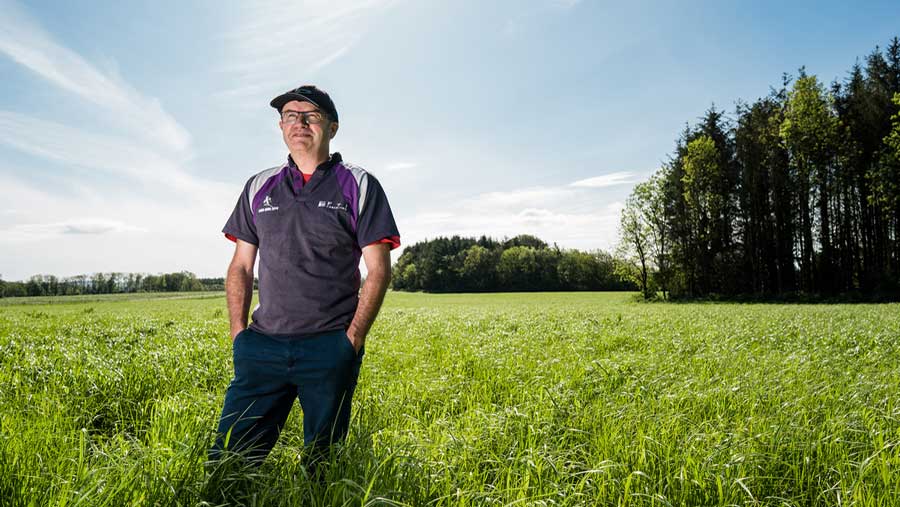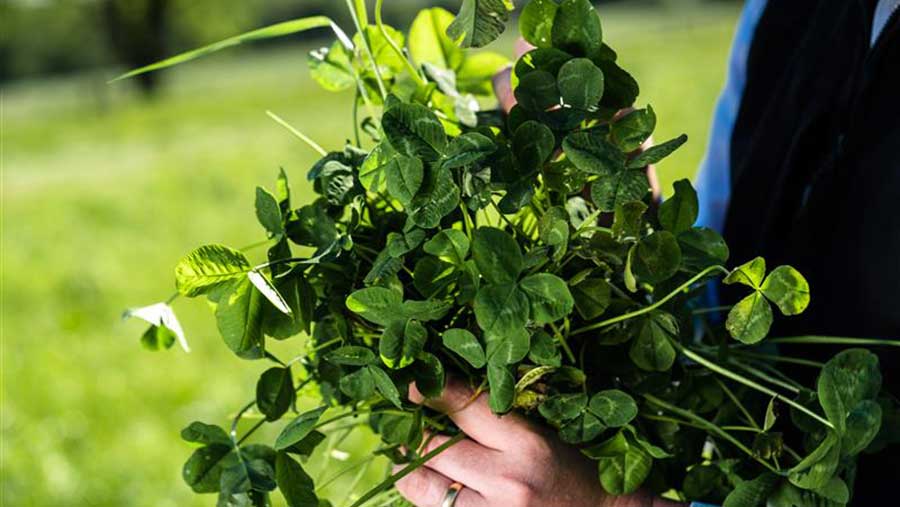Advertiser content
How organic dairy farmer increased protein from forage
 Tom Harris © Germinal
Tom Harris © Germinal British livestock farmers continue to produce outstanding meat and milk despite facing uncertain industry conditions.
In response, Germinal is seeing more and more farmers mitigate that uncertainty by producing high-quality, homegrown forage.
Tom Harris oversees a mixed organic farming system in Boncath, North Pembrokeshire.
The dairy system has 370 milking cows, which are all autumn calving. Beef is reared from those cattle and the farm also has 1,000 ewes. For Tom, homegrown forage production is fundamental to his business.
Soil: The growth platform
The farm is positioned on quite shallow soil with a lot of small rocks, best described as shale loam. Tom sees soil health as essential to forage production.
“There’s no point investing in expensive crops unless you’ve got the soil which can make those crops grow. You don’t want to compact it too much. You want to make sure the nutrients are correct.”
Welsh soil is quite acidic, Tom explains while revealing his optimal soil fertility targets: “We aim for a soil pH of 6 to 6.5, and P and K levels above 2, which is where we can get to as an organic unit.
“Phosphate and potash levels are quite tricky to manage on an organic farm because you don’t have access to conventional fertiliser.” To overcome this challenge, Tom uses slurry and farm-made manure.
Ben Wixey, Germinal’s Agricultural Director, agrees: “Soil fertility makes a huge difference when sowing grass and forage, which won’t grow well if the pH is wrong or if there’s not enough potash or phosphate.”
Using Aber High Sugar Grasses
Producing homegrown forage is fundamental to Tom’s system: “We try to be as self-sufficient as we can, so we grow silage to feed the dairy cows.”
In spring 2023, Tom sowed a silage mixture designed by Germinal, formulated with Aber High Sugar Grasses (Aber HSG) and white clover varieties.
“We’ve been using Germinal’s Aber HSG varieties for the last 20 odd years. We use them on the basis that they produce high sugars in the grass, which should make better silage.
“It’s been important that we have a mixture designed for our specific needs.”
“Aber HSG varieties have higher sugar content in the leaf,” Ben explains. “Therefore, more energy is going into the rumen and greater microbial protein is being produced.
“This means more protein from forage is absorbed, which results in higher liveweight gains and milk production, while reducing harmful ammonia and urea emissions.”
Clover is essential forage for Tom
Alongside grass, clover is another vital forage source for Tom: “We include clover in pretty much every grass seed mix we use organically.
“We don’t have access to conventional nitrogen fertiliser, but clover can fix nitrogen from the air and turn it into nitrates.
“Clover is vital for us,” Tom explains. Without it, we wouldn’t get the nitrogen we need for grass growth. Plus, it puts protein into the silage, so it’s a double win.”
Ben adds: “If we can get grass and clover leys together as the norm, rather than grass only, that’s a huge win for the environment by reducing the use of bought-in fertiliser.

© Germinal
Performance plus sustainability
“If you can produce more nitrogen from clover in the sward, then you’re also getting much cheaper production,” Ben continues.
“Increasing the percentage of clover will also lift intake, giving you a highly productive ley that’s sustainable for the environment and productive and profitable for the farmer.”
This is a concept Tom agrees with: “If we’re more efficient and more sustainable on the farm, then that will work for the environment as well.”
Germinal has released brand-new Climate Smart mixtures ranges that have been scientifically designed to take on five environmental challenges impacting British grassland farmers:
- Emissions reduction
- Nutrient efficiency
- Soil support
- Plant resilience
- Environmental schemes
High-quality, high-yielding clovers are used across the ranges to give you the sustainable production benefits Tom Harris is seeing. Explore the ranges, find your ideal mixtures, and bring performance plus sustainability benefits to your grassland system.
Provided by
This year, Germinal proudly celebrates 200 years of innovation in grass and forage seed. We develop sustainable grassland varieties and supply premium agricultural seed to the UK, Irish, and New Zealand markets, also serving the professional amenity sector. Founded in 1825, we are a sixth-generation family business with a rich history. Working closely with industry partners, we share expertise and advance research to drive progress in agriculture. Our commitment to plant breeding, sustainability, and innovation ensures we continue shaping a productive and responsible food system for the future.
